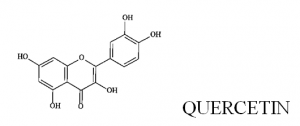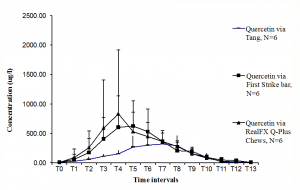Project Team: D. Kaushik (Rutgers), P. Dunne, Ph.D. (U.S. Army, Natick), K. Conca, Ph.D. (U.S. Army, Natick),
P. Clarkson, Ph.D. (University of Amherst), K. O’Fallon (University of Amherst), B. Michniak-Kohn, Ph.D. (Principal Investigator, Rutgers)

Animal studies have shown some unique and potentially remarkable effects of quercetin with as little as 7 days of pre-treatment:
- Increased number of mitochondrial enzymes (muscle & brain)
- Increased endurance capacity
- Decreased muscle inflammation (post-exercise)
- Potential improvement in immune function
Objectives of Research:

Development and validation of quercetin assay in plasma & urine for analysis of samples from following studies:
- Study 1: Quercetin absorption via three oral carrier systems in human subjects (Q Chews, First Strike Bars, Tang);
- Study 2: Effect of quercetin on maximal oxygen uptake in human subjects;
- Study 3: Effect of quercetin on exercise performance of human subjects in heat stress;
- Study 4: Effect of quercetin on muscle soreness in human subjects.

Figure 1. Total plasma Quercetin (μg/L) against time in human volunteers following oral administration in Q chews, First Strike Bars and Tang (Study 1).
Funding Source: U.S. Army Contract # W911QY-07-C-0027.
